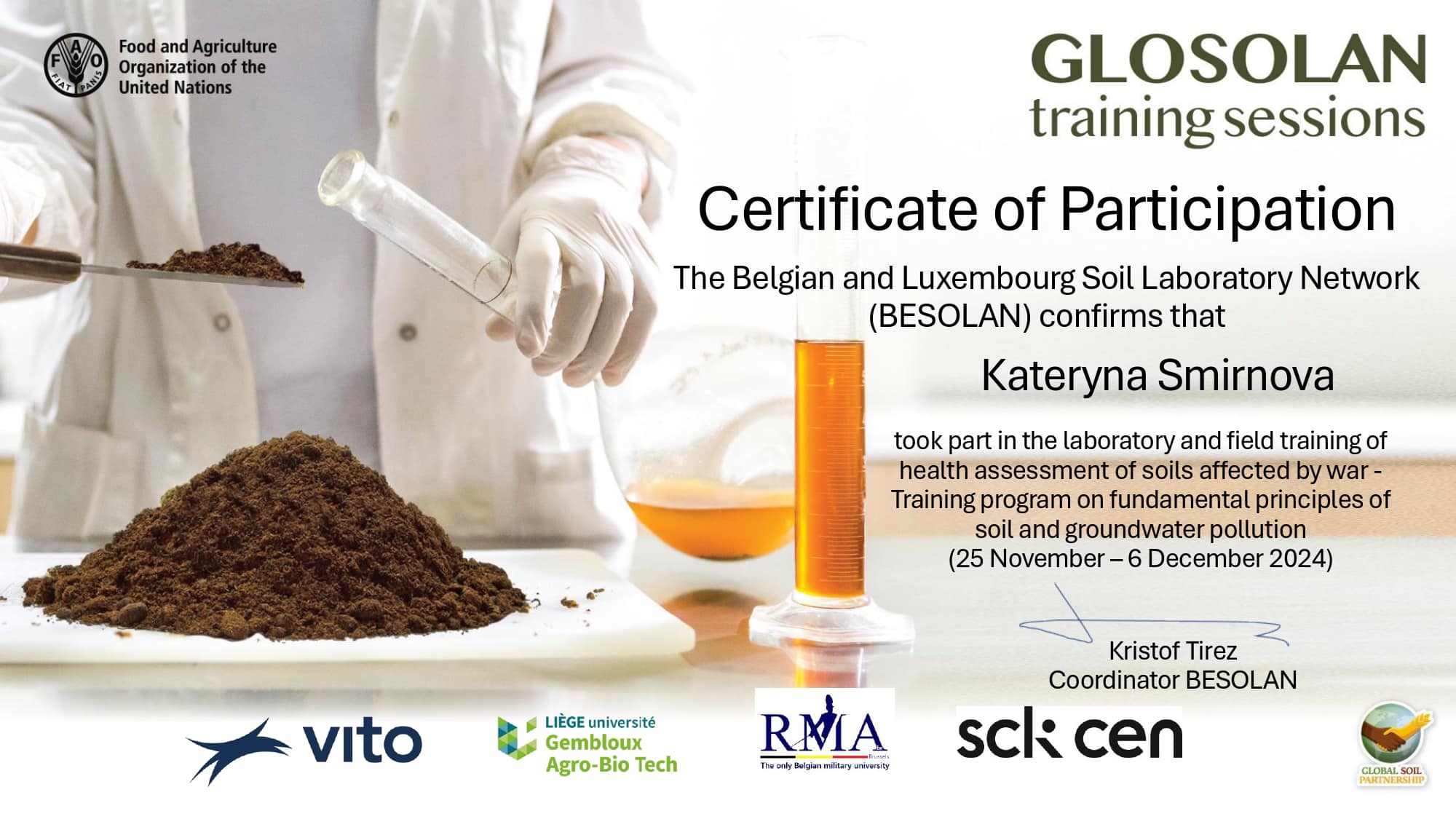From November 25 to December 6, 2024 Head of the Soil Protection Department of the NSC ISSAR Kateryna Smirnova passed internship (practical part of a specialized training program for experts in sanitary assessment, monitoring and management of war-affected soils) at the Vlaamse lnstelling voor Technologisch Onderzoek (VITO) in the Kingdom of Belgium.
The educational program, in which 11 specialists from Ukraine participated, has been launched by Food and Agriculture Organization of the United Nations (FAO) in collaboration with the Belgium and Luxembourg Soil Laboratory Network (BESOLAN), with the support of the governments of Belgium, Canada and Norway, in partnership with the Belgian Institute Flemish Institute for Technological Research (VITO). This partnership aims to address the challenges caused by the war in Ukraine since February 2022 and focuses on conducting a comprehensive assessment of the condition of soils affected by hostilities and developing the technical capacity of Ukrainian soil scientists.
The possibility of soil contamination with heavy metals, explosives and other pollutants as a result of war creates risks for the environment, agricultural productivity and safety of agricultural products. The vivid and extremely interesting training, developed by specialists from VITO, the Belgian soil laboratory network BESOLAN and the Global Soil Laboratory Network (GLOSOLAN) under the auspices of the FAO Global Soil Partnership, allowed Ukrainian researchers to master innovative soil research methods and gain theoretical and practical skills borrowed from Belgium's rich experience in soil management and remediation.
The theoretical part of the training consisted of 20 online sessions covering the basics of soil contamination, sampling techniques, pollutant distribution modeling, and data analysis and interpretation tools. The next stage was practical training in soil and groundwater sampling and analysis using state-of-the-art instrumentation in the soil laboratories of the Belgian BESOLAN network (VITO headquarters (Mol), SCK CEN (Mole), RMA (Brussels) and Gembloux Agro-Bio Tech (m. Gembloux).
The detailed field training covered techniques and methods for sampling soil and groundwater in an agronomic aspect, as well as within the framework of studies of their possible contamination with pollutants in the case of the Flemish region, field methods for measuring pH and electrical conductivity in groundwater.
All sessions of the laboratory part of the training were aimed at familiarizing participants in detail with modern methods of soil diagnostics regarding their fundamental characteristics and qualitative state (content of organic carbon, NPK, sulfates, available trace elements Cu, Fe, Mn, Zn, cation exchange capacity and soil particle size distribution) and pollution indicators, such as Sb, As, Cd, Cr, Cu, Pb, Hg, Ni, Se, Zn, V, Sr, Sr-90 and Cs-137, polyaromatic hydrocarbons, residues of energy substances and their metabolites in the soil, as well as with the latest developments in environmental health policy and safety in the laboratory context.
The unique experience, which Belgian scientists have carefully shared, is a useful contribution to understanding the extent of soil contamination resulting from hostilities, which is crucial for developing effective strategies for revitalizing the land fund, supporting environmentally sound agricultural land use, and sustainable land resource management.
We express our sincere gratitude to the specialists of FAO, VITO, BESOLAN and everyone involved for the highly professional organization of the educational program, support for Ukrainian specialists in ensuring food security and the development of Ukrainian soil science!
More details: Facebook FAO Ukraine, LinkedIn VITO


